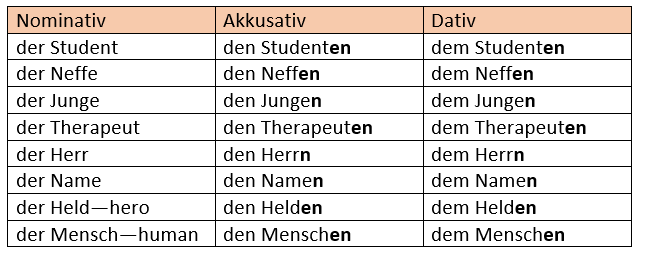15 Proficiency Interviews 2: N-Nouns
PI-2: N-nouns
By now, you have learned the nominative, accusative, and dative cases. You know that masculine direct objects get an extra –n on the definite and indefinite articles in the accusative case.
Mein Vater hat einen Sessel gekauft.
Wann putzt du den Herd?
Es gibt einen Schrank in meinem Schlafzimmer.
There are also a few nouns that take an extra –n in both the accusative and dative cases. (But not in the nominative case!) These are mostly all masculine and mostly refer to people or animals.

- Nominative: Mein Neffe heißt Mark.
- Accusative: Hast du meinen Neffen kennengelernt?
- Dative: Zeig meinem Neffen das Foto von Neuschwanstein.
FRAGE: But why do we have these weak n-nouns that add an extra –n? Where did it come from?
ANTWORT: Back in the day, Old High German and many other old languages added to the end of nouns to show what case they were in. Nowadays, they have pretty much evolved to the point where they don’t do that anymore. These words above never lost the –n in German. (Other languages, such as Russian, still put endings on most all of their nouns to show the case.)
FRAGE: So when does it add the –n in German?
ANTWORT: Everywhere except the nominative case.
Since you will be using the accusative and dative cases a lot in the next section, you will review the accusative and dative pronouns in the next exercise together with n-nouns.
Ex. B: Nicos Weg. Episode 54: Jahreszeiten. Watch the video and do the online activities. You will review comparative and superlative, which you learned in Section PI-1.
https://learngerman.dw.com/en/jahreszeiten/l-37651758

